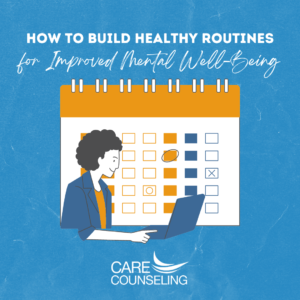How to Build Healthy Routines for Improved Mental Well-Being

Habits are powerful drivers that influence our daily lives, impacting both our physical and mental well-being. Understanding the psychology of habits allows us to harness their potential for positive change and improved mental health. In this blog post, we will explore the science behind habits, the role they play in mental well-being, and practical strategies to build healthy routines for a happier and more fulfilling life.
- The Science Behind Habits
Habits are automatic behaviors that our brains develop over time as a way to conserve mental energy. The habit loop consists of three components: the cue (trigger), the routine (behavior), and the reward. When we repeat a behavior in response to a specific trigger and receive a rewarding outcome, our brains reinforce the habit loop, making the behavior more automatic.
- Habits and Mental Well-Being
Habits have a profound impact on mental well-being as they influence our thoughts, emotions, and daily actions. Positive habits can boost self-esteem, resilience, and emotional regulation, while unhealthy habits can contribute to stress, anxiety, and other mental health challenges.
- Building Healthy Habits for Improved Mental Health
- Identify Your Triggers: Recognize the cues that prompt your behaviors. Whether it’s stress, boredom, or a specific time of day, understanding your triggers is the first step towards building healthier routines.
- Choose Positive Routines: Replace unhealthy habits with positive ones that contribute to your well-being. For example, instead of reaching for sugary snacks when stressed, practice deep breathing or take a short walk to manage stress more effectively.
- Set Realistic Goals: Start small and set achievable goals. Building healthy habits takes time and consistency, so avoid overwhelming yourself with drastic changes.
- Use Habit Stacking: Attach new habits to existing ones. For example, if you want to meditate regularly, do it right after your morning coffee or before bedtime.
- Monitor Your Progress: Keep track of your habits and progress. Use a habit tracker or journal to record your daily routines and assess your development over time.
- The Power of Positive Affirmations
Positive affirmations are powerful tools to reinforce healthy habits and improve mental well-being. Replace self-limiting beliefs with positive statements that promote self-compassion and optimism.
- Be Kind to Yourself
Be patient and kind to yourself during the habit-building process. It’s normal to encounter setbacks and challenges, but self-compassion helps you maintain motivation and persevere in building healthy routines.
- Harnessing the Habit of Gratitude
Practicing gratitude is a habit that can significantly impact mental well-being. Regularly expressing gratitude can foster a positive outlook, reduce stress, and increase overall life satisfaction.
- Overcoming Obstacles
Identify potential obstacles that may hinder your progress and develop strategies to overcome them. Whether it’s lack of time, motivation, or external pressures, having a plan in place helps you stay on track.
- Building a Support System
Share your habit-building journey with friends or family members who can offer encouragement and support. Joining a community or support group can also provide accountability and motivation.
The psychology of habits reveals the significant influence these automatic behaviors have on our mental well-being. By understanding the habit loop and incorporating positive routines into our lives, we can foster resilience, emotional regulation, and improved mental health.
Building healthy habits requires self-awareness, goal setting, and a willingness to be patient and kind to ourselves. Positive affirmations, gratitude, and support systems can enhance the habit-building process and contribute to a more fulfilling life.
As we harness the power of habits to support our mental well-being, let us remember that small, consistent changes can lead to significant transformations. Embrace the journey of building healthy routines and celebrate the positive impact it brings to your mental health and overall happiness.



























